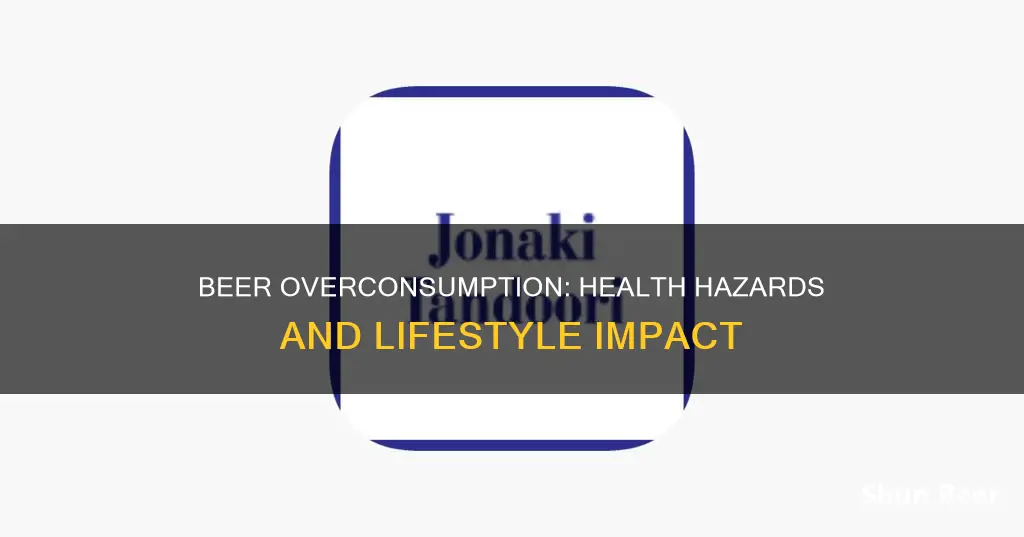
Drinking too much beer can have a serious impact on your health. While moderate alcohol consumption is often considered low-risk, there is no safe amount of alcohol to consume. Drinking too much beer can lead to several health issues, including weight gain, obesity, heart disease, liver disease, and alcohol dependency. Excessive beer consumption can also cause immediate side effects such as trouble controlling emotions, accidents, violent activities, and alcohol poisoning. Long-term effects include hypertension, hemorrhagic stroke, weakened immune system, learning and memory problems, and job-related issues. It is important to drink in moderation, which is defined as one drink per day for women and two drinks per day for men, to minimize the negative consequences of alcohol consumption.
| Characteristics | Values |
|---|---|
| Brain | Interferes with the brain's communication pathways, affecting mood, behaviour, clear thinking, and coordination. |
| Heart | Cardiomyopathy, arrhythmias, and high blood pressure. |
| Liver | Steatosis, or fatty liver. |
| Pancreas | Pancreatitis. |
| Cancer | Mouth, throat, breast, oesophageal, colon, and liver cancer. |
| Immune System | Weakened immune system, making the body more prone to diseases like pneumonia and tuberculosis. |
| Sleep | Insomnia and other sleep concerns. |
| Libido and Sexual Function | Prevent sex hormone production, erectile dysfunction, and lower libido. |
| Appetite and Weight | Weight gain and obesity. |
| Memory and Concentration | Problems with memory and concentration. |
| Mental Health | Worsening of anxiety, depression, bipolar disorder, and other mental health conditions. |
| Digestion | Diarrhea, painful stools, ulcers, and hemorrhoids. |
What You'll Learn

Increased risk of cancer
Drinking too much beer can have serious health consequences, and the effects on the body start from the moment you take your first sip. One of the most significant risks associated with excessive alcohol consumption is an increased risk of developing various types of cancer.
According to the National Cancer Institute (NCI) and the National Institute on Alcohol Abuse and Alcoholism (NIAAA), there is a strong scientific consensus that alcohol drinking can cause several types of cancer. The evidence shows that the more alcohol a person consumes, especially over a long period, the higher their risk of developing an alcohol-associated cancer becomes. Even those who have no more than one drink per day or engage in binge drinking have a slightly increased risk of certain cancers. Based on data from 2009, approximately 3.5% of cancer deaths in the United States, or about 19,500 deaths, were linked to alcohol consumption.
Alcohol consumption is associated with a higher risk of head and neck cancers, including oral cavity, pharynx (throat), and larynx (voice box) cancers. Moderate drinkers have a significantly higher risk of these cancers compared to non-drinkers, and the risk increases further for heavy drinkers. The combination of alcohol and tobacco use has a multiplicative effect on the risk of these cancers.
Esophageal cancer, particularly esophageal squamous cell carcinoma, is also linked to alcohol consumption. The risk increases with the amount of alcohol consumed, and those with a deficiency in an enzyme that metabolizes alcohol are at a much higher risk if they drink.
Heavy alcohol consumption is associated with a nearly doubled risk of developing certain types of liver cancer. Alcoholic beverages can damage the liver, leading to inflammation and long-term conditions such as cirrhosis, which can permanently damage the liver.
Breast cancer risk is also influenced by alcohol intake. Research has shown that even one drink per day can increase a woman's risk of breast cancer by 5% to 15% compared to non-drinkers. The risk increases further with higher alcohol consumption.
Additionally, moderate to heavy alcohol consumption is associated with an increased risk of colorectal cancer. While the evidence for other types of cancer is inconsistent, studies suggest that alcohol consumption may be linked to an increased risk of melanoma, prostate cancer, and pancreatic cancer.
The mechanisms by which alcohol increases cancer risk are multifaceted. One key factor is the metabolization of ethanol, the type of alcohol found in alcoholic beverages, into acetaldehyde, a toxic chemical and probable human carcinogen. Acetaldehyde can damage DNA and proteins in the body. Alcohol consumption can also generate reactive oxygen species, which can damage DNA, proteins, and lipids through oxidation. Furthermore, alcohol interferes with the body's ability to absorb essential nutrients such as vitamins and minerals, which may be associated with a reduced ability to protect against cancer. Alcohol can also increase blood levels of estrogen, a hormone linked to breast cancer risk.
EMS Workers and Alcohol: Can They Drink?
You may want to see also

Liver problems
Drinking too much beer can have serious effects on the liver. The liver helps to break down and remove toxins and harmful substances, including alcohol, from the body. However, long-term alcohol use interferes with this process and increases the risk of alcohol-related liver disease and chronic liver inflammation.
Heavy drinking can lead to a variety of liver problems and inflammations, including steatosis, or fatty liver. Alcohol-related liver disease is a potentially life-threatening condition that leads to toxin and waste buildup in the body. Chronic liver inflammation can cause scarring, or cirrhosis, which may permanently damage the liver.
In addition to liver damage, excessive beer consumption can also increase the risk of other health problems, such as hypertension, hemorrhagic stroke, weakened immune system, learning and memory problems, job-related issues, and alcohol use disorders. It is important to drink in moderation, which is defined as up to two drinks per day for men and one drink per day for women, with one drink being about 12 ounces.
Bud Light Drinkers: Their Unique Beer Drinking Habits
You may want to see also

Mental health issues
Drinking too much beer can have a significant impact on mental health. Alcohol is a depressant, which can disrupt the balance of neurotransmitters in the brain, affecting feelings, thoughts, and behaviour. While drinking may provide temporary relief from difficult emotions, the effect is short-lived, and can quickly lead to more negative feelings, such as anger, depression, or anxiety. This can create a cycle of dependence, where the drinker feels they need alcohol to cope with negative emotions.
Alcohol can also interfere with sleep, causing exhaustion and difficulty concentrating, which are closely linked to depression. It can also increase the risk of dangerous or impulsive behaviour, which may put the drinker in risky or dangerous situations that negatively impact their mood. This can create a vicious cycle, where drinking to cope with depression leads to more drinking to manage worsening symptoms.
For those with pre-existing mental health issues, alcohol can exacerbate these problems. People with depression or anxiety may turn to alcohol as a form of self-medication, but excessive drinking can worsen these conditions over time. Alcohol can also interfere with the effectiveness of antidepressants and increase side effects, creating a further cycle of dependence.
In addition, alcohol can lower inhibitions and make bad feelings more intense, leading to anger, aggression, or deep regret. It can also trigger impulsive behaviour, increasing the risk of self-harm or suicide. Alcohol abuse is strongly linked to self-harm and suicide, and heavy drinking can make people more likely to act on suicidal thoughts or impulses.
Finally, alcohol can impact mental health by causing social anxiety and low self-esteem. Drinking to manage social anxiety can prevent people from developing social and coping skills, leading to a reliance on alcohol in social situations. This can create a cycle of avoidance, where people start to avoid social situations that do not involve alcohol.
Yogurt and Beer: A Safe Pairing or Not?
You may want to see also

Digestive issues
Drinking too much beer can have a negative impact on your digestive system. Here are some ways in which excessive beer consumption can affect digestion:
Tissue Damage and Malnutrition
Heavy drinking can damage the tissues in the digestive tract, including the intestines, impairing their ability to absorb nutrients and vitamins from food. This can lead to malnutrition over time.
Bloating and Gas
Drinking excessive amounts of beer can cause bloating and gas. This is likely due to the damage to the digestive tract and the impaired absorption of nutrients.
Diarrhoea and Painful Stools
Excessive beer consumption can lead to digestive discomfort and even digestive tract issues. It can cause diarrhoea and painful bowel movements.
Ulcers and Haemorrhoids
Ulcers and haemorrhoids can be caused by dehydration and constipation, which are often associated with heavy drinking. Ulcers can lead to dangerous internal bleeding, which can be life-threatening if not treated promptly.
Increased Risk of Pancreatitis
Drinking too much beer can increase the risk of pancreatitis, which is an inflammation of the pancreas. Pancreatitis can cause abdominal pain and activate the release of pancreatic digestive enzymes. It can become a long-term condition and lead to serious complications.
Gay People and Beer: A Cultural Perspective
You may want to see also

Weight gain and obesity
Beer is made by fermenting sugars from starches and its major components are barley, hops, water, and yeast. It can be alcoholic or non-alcoholic. While non-alcoholic beer is likely safe for most people, drinking more than two 12-ounce glasses of alcoholic beer daily is considered unsafe. Drinking higher amounts of alcoholic beer can lead to several health issues, including weight gain and obesity.
Beer contains empty calories, and drinking too much of it can make you prone to weight gain and obesity, which can further lead to other health issues. Excessive beer consumption can also increase the risk of heart disease, liver disease, and alcohol dependency.
Drinking beer can cause malnutrition by damaging the tissues in the digestive tract and preventing the intestines from properly digesting food and absorbing nutrients and vitamins. This can lead to issues such as bloating and gas, as well as more severe health risks like ulcers and hemorrhoids.
In addition to the direct impact on weight, excessive beer consumption can also contribute to weight-related issues such as high blood pressure and an increased risk of heart disease. Therefore, it is important to drink in moderation, which is defined as up to two drinks a day for men and one drink a day for women, with one drink being equivalent to about 12 ounces.
Beer and Zyrtec: Is It Safe to Mix?
You may want to see also
Frequently asked questions
Excessive beer consumption can lead to a range of short-term effects, including heartburn, intoxication, and a hangover.
Long-term overconsumption of beer can cause various health issues, such as a beer belly, increased blood pressure, worsened heart health, and weight gain.
Yes, drinking too much beer can worsen existing cardiovascular issues, liver disease, neurological conditions, and stomach ulcers. It can also increase the risk of certain types of cancer.
Generally, drinking more than two 12-ounce glasses of beer per day is considered excessive and potentially unsafe. However, this can vary depending on individual factors such as age, medical history, and lifestyle.







